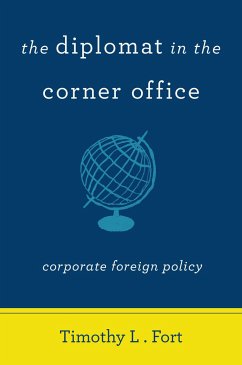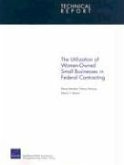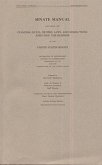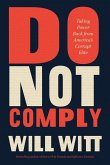- Broschiertes Buch
- Merkliste
- Auf die Merkliste
- Bewerten Bewerten
- Teilen
- Produkt teilen
- Produkterinnerung
- Produkterinnerung
Timothy L. Fort is the Eveleigh Professor of Business Ethics and Professor of Business Law and Ethics in the Kelley School of Business at Indiana University.
Andere Kunden interessierten sich auch für
![The Utilization of Women-Owned Small Businesses in Federal Contracting The Utilization of Women-Owned Small Businesses in Federal Contracting]() Elaine ReardonThe Utilization of Women-Owned Small Businesses in Federal Contracting26,99 €
Elaine ReardonThe Utilization of Women-Owned Small Businesses in Federal Contracting26,99 €![Senate Manual 2008: Containing the Standing Rules, Orders, Laws, and Resolutions Affecting the Business of the United States Senate Senate Manual 2008: Containing the Standing Rules, Orders, Laws, and Resolutions Affecting the Business of the United States Senate]() Senate Manual 2008: Containing the Standing Rules, Orders, Laws, and Resolutions Affecting the Business of the United States Senate100,99 €
Senate Manual 2008: Containing the Standing Rules, Orders, Laws, and Resolutions Affecting the Business of the United States Senate100,99 €![The Canadian Diplomat The Canadian Diplomat]() Marcel CadieuxThe Canadian Diplomat42,99 €
Marcel CadieuxThe Canadian Diplomat42,99 €![Do Not Comply Do Not Comply]() Will WittDo Not Comply17,99 €
Will WittDo Not Comply17,99 €![Chronicles of the St. James St. Methodist Church Montreal: From the First Rise of Methodism in Montreal to the Laying of the Corner-stone of the New C Chronicles of the St. James St. Methodist Church Montreal: From the First Rise of Methodism in Montreal to the Laying of the Corner-stone of the New C]() Chronicles of the St. James St. Methodist Church Montreal: From the First Rise of Methodism in Montreal to the Laying of the Corner-stone of the New C19,99 €
Chronicles of the St. James St. Methodist Church Montreal: From the First Rise of Methodism in Montreal to the Laying of the Corner-stone of the New C19,99 €![The Ethics of Policing The Ethics of Policing]() The Ethics of Policing45,99 €
The Ethics of Policing45,99 €![The Office of Lieutenant-Governor The Office of Lieutenant-Governor]() John SaywellThe Office of Lieutenant-Governor44,99 €
John SaywellThe Office of Lieutenant-Governor44,99 €-
-
-
Timothy L. Fort is the Eveleigh Professor of Business Ethics and Professor of Business Law and Ethics in the Kelley School of Business at Indiana University.
Hinweis: Dieser Artikel kann nur an eine deutsche Lieferadresse ausgeliefert werden.
Hinweis: Dieser Artikel kann nur an eine deutsche Lieferadresse ausgeliefert werden.
Produktdetails
- Produktdetails
- Verlag: Stanford University Press
- Seitenzahl: 224
- Erscheinungstermin: 28. Oktober 2015
- Englisch
- Abmessung: 255mm x 121mm x 18mm
- Gewicht: 345g
- ISBN-13: 9780804796606
- ISBN-10: 0804796602
- Artikelnr.: 42796087
- Herstellerkennzeichnung
- Libri GmbH
- Europaallee 1
- 36244 Bad Hersfeld
- gpsr@libri.de
- Verlag: Stanford University Press
- Seitenzahl: 224
- Erscheinungstermin: 28. Oktober 2015
- Englisch
- Abmessung: 255mm x 121mm x 18mm
- Gewicht: 345g
- ISBN-13: 9780804796606
- ISBN-10: 0804796602
- Artikelnr.: 42796087
- Herstellerkennzeichnung
- Libri GmbH
- Europaallee 1
- 36244 Bad Hersfeld
- gpsr@libri.de
Timothy L. Fort is the Eveleigh Professor of Business Ethics and Professor of Business Law and Ethics in the Kelley School of Business at Indiana University. He is a 2024 Noble Peace Prize Nominee.
Contents and Abstracts
1Corporate Foreign Policy
chapter abstract
In a global business environment, companies increasingly establish their
own identity apart from their country of historical origin. This chapter
details examples of the choices companies have made and argues that
companies should consciously adopt their own foreign policy, which is
benefitted from peace building. The chapter describes the ways in which
companies can do this in an introductory fashion.
2Causes of War and Lessons for Balances of Power
chapter abstract
This chapter sets out the research to date from the field of international
relations that categorizes the reasons war begin. It will be noted that
often, violence erupts because of an imbalance of power. The chapter argues
that businesses are both subject to balance of power and contribute to them
and thus can have a role in the balance of power equation that could
contribute to peace.
3Could Peace Break Out in this Day and Age?
chapter abstract
Studies of deep history seem to be in dispute as to whether humans are more
or less peaceful today than in the past. This chapter takes these
conflicting arguments from leading scholars and shows that, despite their
differences, what unites them is a role that business can play in "gentle
commerce." An ethically-informed set of business practices indeed seem to
take advantage of all worlds in making the world more peaceful.
4
chapter abstract
An ethically-informed set of business practices also seems to find
increasing acceptance within mainstream economic literature which
recognizes the importance of trust. Ethical practices helpfully prevent
more egregious behavior, which benefits commerce as a whole and the same
practices also promote peace building. This chapter thus details major
economic thought as to why and how this is possible and connects this
literature to peace building
5Peacemaking, Peacekeeping, and Peace building
chapter abstract
Businesses contribute to peace in different ways. Some promote peacemaking
and peacekeeping. Others focus on a more diffused sense of peace building.
This chapter provides case studies that demonstrate these different way sin
which business contributes to peace.
6Peace Entrepreneurs, Instrumental Corporate Foreign Policy, and
Unconscious Peace Building
chapter abstract
Depending on a businessperson's conscious orientation, businesses might
also contribute to peace intentionally (as peace entrepreneurs) as
instrumentally a smart business strategy (corporate foreign policy) and
completely unconsciously (through ethical practices shorn of peace building
intention). This chapter recognizes these different approaches in hopes of
providing more refined academic categories of analysis.
7Little Brother Government Policy
chapter abstract
Rather than focusing directly on government regulation of business, this
chapter suggests that a better role for government is to create incentives
for business to engage in ethical and peace building activity. Thus, it
follows a model of the U.S. Federal Sentencing Guidelines which flexibly
allows companies to achieve ethical practices without mandating particular
ones. This is a strategy of an open society versus a closed one, which
itself provides greater likelihood for peace building.
7Little Brother Government Policy
chapter abstract
Rather than focusing directly on government regulation of business, this
chapter suggests that a better role for government is to create incentives
for business to engage in ethical and peace building activity. Thus, it
follows a model of the U.S. Federal Sentencing Guidelines which flexibly
allows companies to achieve ethical practices without mandating particular
ones. This is a strategy of an open society versus a closed one, which
itself provides greater likelihood for peace building.
8A New Great Awakening
chapter abstract
Civil society can contribute to businesses' contribution by creating an
environment conducive to business's role. Thus, those organizations that
specifically devote themselves to peace can partner with businesses.
Business associations - such as the chamber of commerce can likewise
encourage the activity that leads to constructive business contributions.
9Why a Peace-Oriented Corporate Foreign Policy is Smart Business
chapter abstract
This final chapter summarizes why it is smart business for companies to
contribute to peace building through their daily work.
1Corporate Foreign Policy
chapter abstract
In a global business environment, companies increasingly establish their
own identity apart from their country of historical origin. This chapter
details examples of the choices companies have made and argues that
companies should consciously adopt their own foreign policy, which is
benefitted from peace building. The chapter describes the ways in which
companies can do this in an introductory fashion.
2Causes of War and Lessons for Balances of Power
chapter abstract
This chapter sets out the research to date from the field of international
relations that categorizes the reasons war begin. It will be noted that
often, violence erupts because of an imbalance of power. The chapter argues
that businesses are both subject to balance of power and contribute to them
and thus can have a role in the balance of power equation that could
contribute to peace.
3Could Peace Break Out in this Day and Age?
chapter abstract
Studies of deep history seem to be in dispute as to whether humans are more
or less peaceful today than in the past. This chapter takes these
conflicting arguments from leading scholars and shows that, despite their
differences, what unites them is a role that business can play in "gentle
commerce." An ethically-informed set of business practices indeed seem to
take advantage of all worlds in making the world more peaceful.
4
chapter abstract
An ethically-informed set of business practices also seems to find
increasing acceptance within mainstream economic literature which
recognizes the importance of trust. Ethical practices helpfully prevent
more egregious behavior, which benefits commerce as a whole and the same
practices also promote peace building. This chapter thus details major
economic thought as to why and how this is possible and connects this
literature to peace building
5Peacemaking, Peacekeeping, and Peace building
chapter abstract
Businesses contribute to peace in different ways. Some promote peacemaking
and peacekeeping. Others focus on a more diffused sense of peace building.
This chapter provides case studies that demonstrate these different way sin
which business contributes to peace.
6Peace Entrepreneurs, Instrumental Corporate Foreign Policy, and
Unconscious Peace Building
chapter abstract
Depending on a businessperson's conscious orientation, businesses might
also contribute to peace intentionally (as peace entrepreneurs) as
instrumentally a smart business strategy (corporate foreign policy) and
completely unconsciously (through ethical practices shorn of peace building
intention). This chapter recognizes these different approaches in hopes of
providing more refined academic categories of analysis.
7Little Brother Government Policy
chapter abstract
Rather than focusing directly on government regulation of business, this
chapter suggests that a better role for government is to create incentives
for business to engage in ethical and peace building activity. Thus, it
follows a model of the U.S. Federal Sentencing Guidelines which flexibly
allows companies to achieve ethical practices without mandating particular
ones. This is a strategy of an open society versus a closed one, which
itself provides greater likelihood for peace building.
7Little Brother Government Policy
chapter abstract
Rather than focusing directly on government regulation of business, this
chapter suggests that a better role for government is to create incentives
for business to engage in ethical and peace building activity. Thus, it
follows a model of the U.S. Federal Sentencing Guidelines which flexibly
allows companies to achieve ethical practices without mandating particular
ones. This is a strategy of an open society versus a closed one, which
itself provides greater likelihood for peace building.
8A New Great Awakening
chapter abstract
Civil society can contribute to businesses' contribution by creating an
environment conducive to business's role. Thus, those organizations that
specifically devote themselves to peace can partner with businesses.
Business associations - such as the chamber of commerce can likewise
encourage the activity that leads to constructive business contributions.
9Why a Peace-Oriented Corporate Foreign Policy is Smart Business
chapter abstract
This final chapter summarizes why it is smart business for companies to
contribute to peace building through their daily work.
Contents and Abstracts
1Corporate Foreign Policy
chapter abstract
In a global business environment, companies increasingly establish their
own identity apart from their country of historical origin. This chapter
details examples of the choices companies have made and argues that
companies should consciously adopt their own foreign policy, which is
benefitted from peace building. The chapter describes the ways in which
companies can do this in an introductory fashion.
2Causes of War and Lessons for Balances of Power
chapter abstract
This chapter sets out the research to date from the field of international
relations that categorizes the reasons war begin. It will be noted that
often, violence erupts because of an imbalance of power. The chapter argues
that businesses are both subject to balance of power and contribute to them
and thus can have a role in the balance of power equation that could
contribute to peace.
3Could Peace Break Out in this Day and Age?
chapter abstract
Studies of deep history seem to be in dispute as to whether humans are more
or less peaceful today than in the past. This chapter takes these
conflicting arguments from leading scholars and shows that, despite their
differences, what unites them is a role that business can play in "gentle
commerce." An ethically-informed set of business practices indeed seem to
take advantage of all worlds in making the world more peaceful.
4
chapter abstract
An ethically-informed set of business practices also seems to find
increasing acceptance within mainstream economic literature which
recognizes the importance of trust. Ethical practices helpfully prevent
more egregious behavior, which benefits commerce as a whole and the same
practices also promote peace building. This chapter thus details major
economic thought as to why and how this is possible and connects this
literature to peace building
5Peacemaking, Peacekeeping, and Peace building
chapter abstract
Businesses contribute to peace in different ways. Some promote peacemaking
and peacekeeping. Others focus on a more diffused sense of peace building.
This chapter provides case studies that demonstrate these different way sin
which business contributes to peace.
6Peace Entrepreneurs, Instrumental Corporate Foreign Policy, and
Unconscious Peace Building
chapter abstract
Depending on a businessperson's conscious orientation, businesses might
also contribute to peace intentionally (as peace entrepreneurs) as
instrumentally a smart business strategy (corporate foreign policy) and
completely unconsciously (through ethical practices shorn of peace building
intention). This chapter recognizes these different approaches in hopes of
providing more refined academic categories of analysis.
7Little Brother Government Policy
chapter abstract
Rather than focusing directly on government regulation of business, this
chapter suggests that a better role for government is to create incentives
for business to engage in ethical and peace building activity. Thus, it
follows a model of the U.S. Federal Sentencing Guidelines which flexibly
allows companies to achieve ethical practices without mandating particular
ones. This is a strategy of an open society versus a closed one, which
itself provides greater likelihood for peace building.
7Little Brother Government Policy
chapter abstract
Rather than focusing directly on government regulation of business, this
chapter suggests that a better role for government is to create incentives
for business to engage in ethical and peace building activity. Thus, it
follows a model of the U.S. Federal Sentencing Guidelines which flexibly
allows companies to achieve ethical practices without mandating particular
ones. This is a strategy of an open society versus a closed one, which
itself provides greater likelihood for peace building.
8A New Great Awakening
chapter abstract
Civil society can contribute to businesses' contribution by creating an
environment conducive to business's role. Thus, those organizations that
specifically devote themselves to peace can partner with businesses.
Business associations - such as the chamber of commerce can likewise
encourage the activity that leads to constructive business contributions.
9Why a Peace-Oriented Corporate Foreign Policy is Smart Business
chapter abstract
This final chapter summarizes why it is smart business for companies to
contribute to peace building through their daily work.
1Corporate Foreign Policy
chapter abstract
In a global business environment, companies increasingly establish their
own identity apart from their country of historical origin. This chapter
details examples of the choices companies have made and argues that
companies should consciously adopt their own foreign policy, which is
benefitted from peace building. The chapter describes the ways in which
companies can do this in an introductory fashion.
2Causes of War and Lessons for Balances of Power
chapter abstract
This chapter sets out the research to date from the field of international
relations that categorizes the reasons war begin. It will be noted that
often, violence erupts because of an imbalance of power. The chapter argues
that businesses are both subject to balance of power and contribute to them
and thus can have a role in the balance of power equation that could
contribute to peace.
3Could Peace Break Out in this Day and Age?
chapter abstract
Studies of deep history seem to be in dispute as to whether humans are more
or less peaceful today than in the past. This chapter takes these
conflicting arguments from leading scholars and shows that, despite their
differences, what unites them is a role that business can play in "gentle
commerce." An ethically-informed set of business practices indeed seem to
take advantage of all worlds in making the world more peaceful.
4
chapter abstract
An ethically-informed set of business practices also seems to find
increasing acceptance within mainstream economic literature which
recognizes the importance of trust. Ethical practices helpfully prevent
more egregious behavior, which benefits commerce as a whole and the same
practices also promote peace building. This chapter thus details major
economic thought as to why and how this is possible and connects this
literature to peace building
5Peacemaking, Peacekeeping, and Peace building
chapter abstract
Businesses contribute to peace in different ways. Some promote peacemaking
and peacekeeping. Others focus on a more diffused sense of peace building.
This chapter provides case studies that demonstrate these different way sin
which business contributes to peace.
6Peace Entrepreneurs, Instrumental Corporate Foreign Policy, and
Unconscious Peace Building
chapter abstract
Depending on a businessperson's conscious orientation, businesses might
also contribute to peace intentionally (as peace entrepreneurs) as
instrumentally a smart business strategy (corporate foreign policy) and
completely unconsciously (through ethical practices shorn of peace building
intention). This chapter recognizes these different approaches in hopes of
providing more refined academic categories of analysis.
7Little Brother Government Policy
chapter abstract
Rather than focusing directly on government regulation of business, this
chapter suggests that a better role for government is to create incentives
for business to engage in ethical and peace building activity. Thus, it
follows a model of the U.S. Federal Sentencing Guidelines which flexibly
allows companies to achieve ethical practices without mandating particular
ones. This is a strategy of an open society versus a closed one, which
itself provides greater likelihood for peace building.
7Little Brother Government Policy
chapter abstract
Rather than focusing directly on government regulation of business, this
chapter suggests that a better role for government is to create incentives
for business to engage in ethical and peace building activity. Thus, it
follows a model of the U.S. Federal Sentencing Guidelines which flexibly
allows companies to achieve ethical practices without mandating particular
ones. This is a strategy of an open society versus a closed one, which
itself provides greater likelihood for peace building.
8A New Great Awakening
chapter abstract
Civil society can contribute to businesses' contribution by creating an
environment conducive to business's role. Thus, those organizations that
specifically devote themselves to peace can partner with businesses.
Business associations - such as the chamber of commerce can likewise
encourage the activity that leads to constructive business contributions.
9Why a Peace-Oriented Corporate Foreign Policy is Smart Business
chapter abstract
This final chapter summarizes why it is smart business for companies to
contribute to peace building through their daily work.








